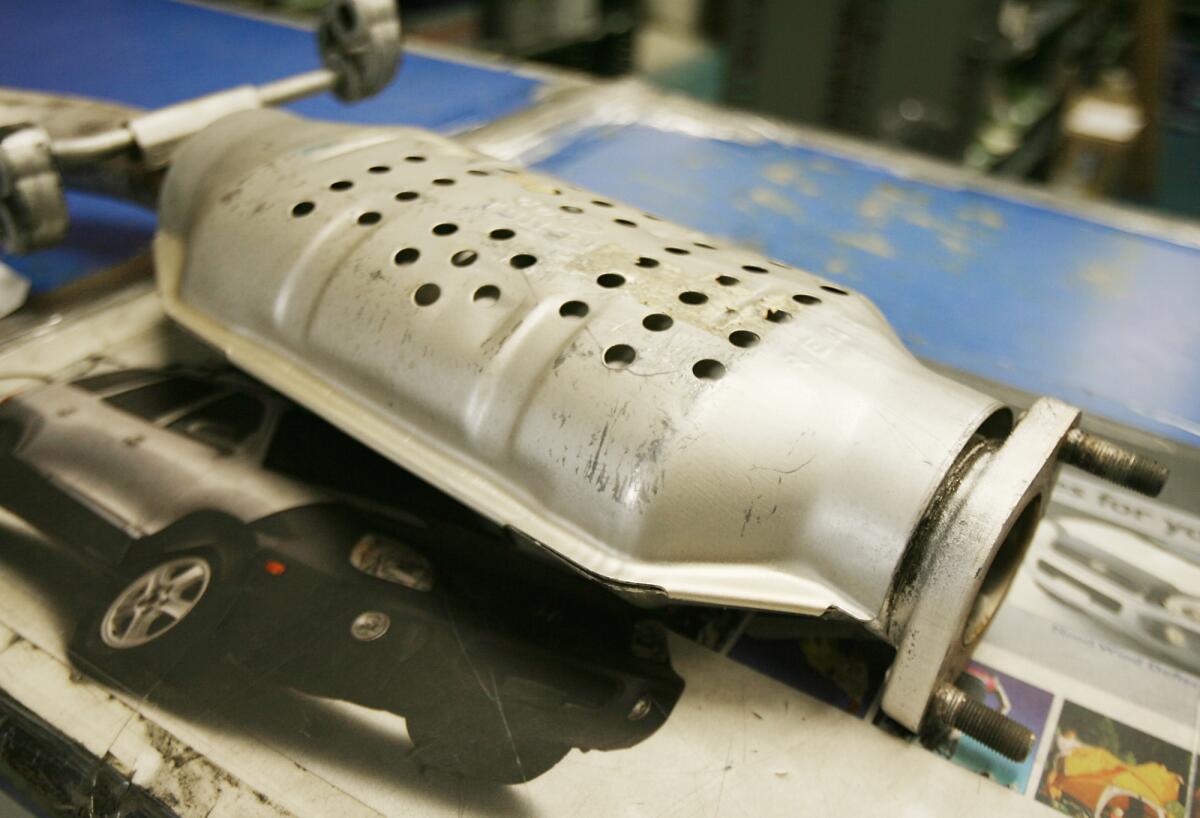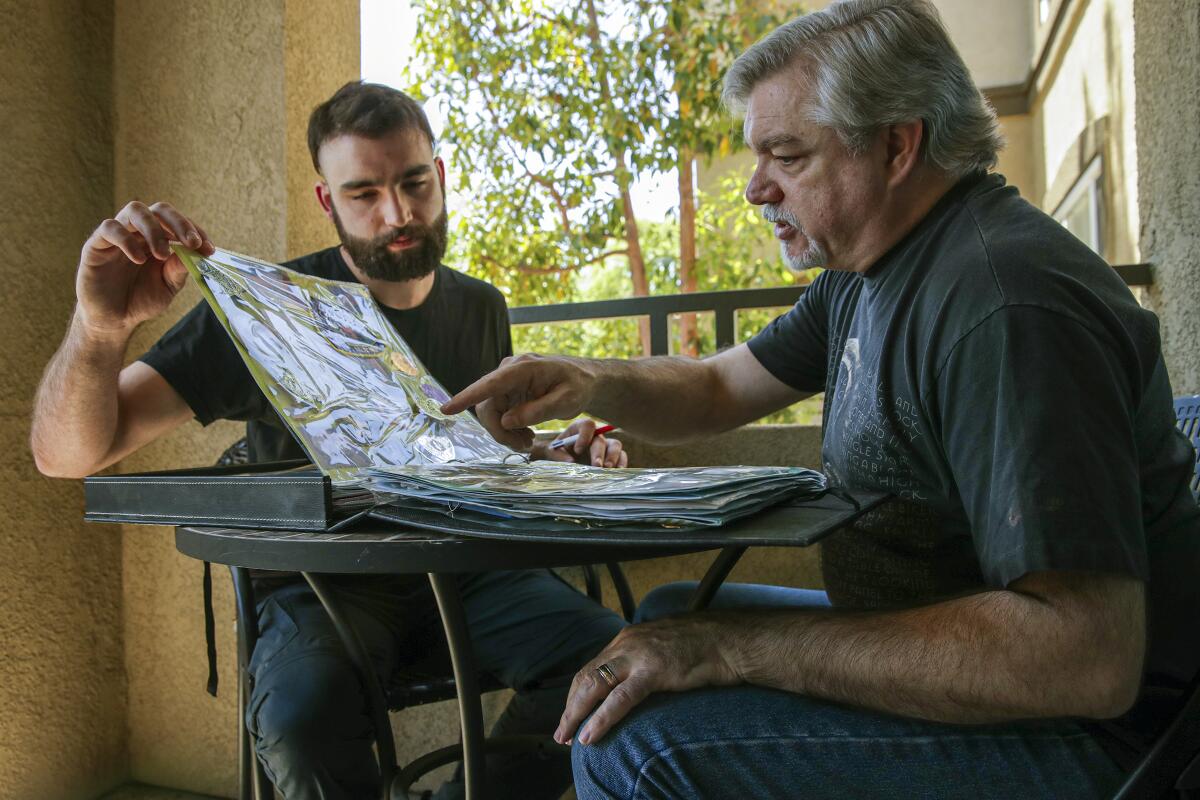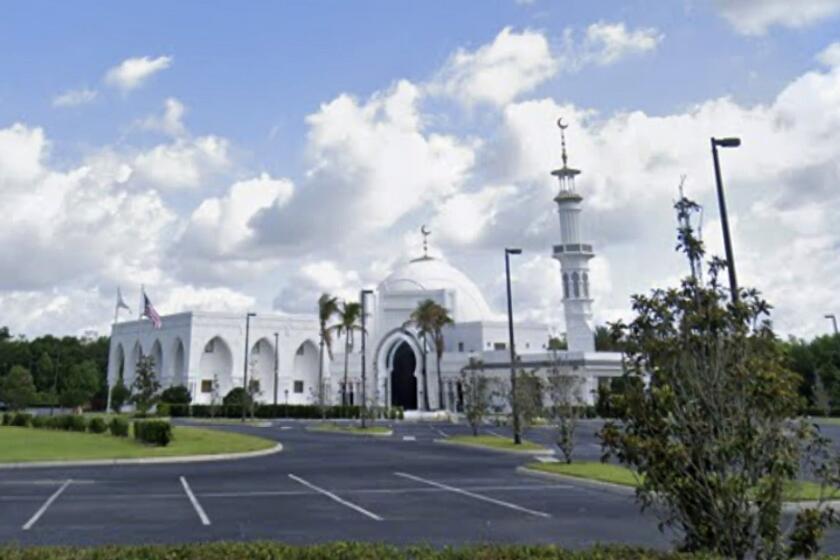Catalytic converter thefts in California: Why they are everywhere, and how you can protect yourself

Good morning, and welcome to the Essential California newsletter. It’s Monday, Aug. 2. I’m Justin Ray.
A 12-year-old Oakland boy was at home with his family last month when he heard a noise outside.
Thieves were trying to steal a catalytic converter from the underside of the Honda Accord parked outside the family’s home in the Maxwell Park neighborhood, the Associated Press reported. The boy’s father threw a rock and a chair at the men to try to scare them away. One of them responded with gunfire, hitting the boy in the foot. It was the second theft attempt of the converter in two weeks.
“When I got shot there, my mom was so worried, “ the boy, Fernando Melendez, told CBS San Francisco/Bay Area. “I was like ‘Mom, it’s not that bad.’ It hurts a little bit, not that much.”
The incident was part of a rash of catalytic converter thefts in California. In March, Los Angeles County sheriff’s deputies arrested 19 suspects believed to be involved in a series of heists. Torrance police picked up 20 people on suspicion of the same charge in late June; information obtained through that operation led to the recovery of 87 stolen converters. And in July, minutes after Sacramento County sheriffs allegedly caught two subjects stealing converters, they received a call and arrested three more suspects for the same crime.
Here’s everything you should know about the crimes, including an explanation of what converters actually do, thieves’ favorite car model and how to protect yourself from becoming a victim.
The Numbers
While converter thefts have always been a problem, they are on the rise from an average of 108 per month in 2018 to 2,347 in December 2020, according to the National Insurance Crime Bureau.
State Farm Insurance reported that customer converter theft claims were up 175% from July 1, 2020, to June 30, 2021, compared to the same period the previous year, the agency recently said. State Farm said California is the worst state for the crime.
The pandemic could be one reason for the upsurge. In March, AAA spokesman Doug Shupe told The Times that converter replacements had increased more than 90% during 2020. “It really is showing us … unfortunately, that the pandemic really did cause some economic distress and hardships for many people,” Shupe said. ”That’s led to [what] I guess you could call enterprising criminals with more time on their hands, and people who are looking for ways to make quick money.”
What They Are and Why They Are Valuable
The catalytic converter is a critical part of a vehicle’s emissions control system, containing rare metals that help unspent fuel in the exhaust gases burn off completely, reducing pollutants. If you don’t have a converter, your car will release a lot of dirty chemicals. Car owners whose catalytic converters are stolen usually hear a loud roar when they turn on the engine. “It sounded like I had a Harley-Davidson in the back seat,” a theft victim told staff writer Faith E. Pinho in March.
Thieves can make hundreds of dollars selling the converters to auto parts supply shops or scrapyards, where they are melted down so the rare metals — including palladium and rhodium — can be extracted. The cost of the metals has soared because of the global demand for emission control devices. An ounce of the metals can be worth thousands of dollars.
Toyota Priuses are a favorite of thieves because they emit fewer pollutants, leaving the converters cleaner and thus more valuable.
How to Protect Yourself
- There are companies that make cages that can be installed around the part, San Francisco Gate reports. They run about $150 to $300.
- The National Insurance Crime Bureau recommends that car owners park inside of garages, or if that isn’t possible, install motion-sensor lights. While the lights may not completely secure the converter, they may act as a deterrent.
- The insurance crime bureau also suggests engraving your VIN on your car’s catalytic converter, and installing an alarm system.
- You may want to cover your converter with a high-temperature fluorescent paint, making it traceable and less attractive to scrap metal dealers, according to NerdWallet.
And now, here’s what’s happening across California:
‘I think you might be my biological father.’ One evening last fall, Joseph Arriaga sent a Facebook message from his Riverside home to a stranger. The 29-year-old Riverside man was trying to sort out the truth about his birth from family folklore, a quest that offered the potential to uplift or devastate two families. “He launched the months-long process that would shift the dynamics of two families and ultimately free him from a heaviness that had shaped his life,” The Times’ Marisa Gerber writes. Los Angeles Times

Note: Some of the sites we link to may limit the number of stories you can access without subscribing.
L.A. STORIES
NBA free agency begins today. That means teams can negotiate with players and agree to deals, which can be signed starting Friday. Both the Clippers and the Lakers face challenges to fill their rosters. The Times’ NBA reporters held a roundtable to discuss what is next for the L.A. franchises. Los Angeles Times
After her botched surgery, she pitched a medical disclosure bill. Doctors are fighting it. Wendy Knech, a Studio City writer and healthcare advocate, was diagnosed in December 2014 with the BRCA2 gene mutation, which has been linked to an increased risk of breast and ovarian cancers. Knech, whose mother died of breast cancer, decided to reduce her risk by having a double mastectomy. The operation left her with nerve damage and chronic pain. She later found out that the surgeon who performed the operation received more than $400,000 from the makers of a device used in the operation. After meeting with her, Assemblyman Adrin Nazarian (D-North Hollywood) introduced legislation requiring doctors to tell patients if they have accepted payments from the makers of drugs and medical devices they are using. AB 1278 is working its way through the Legislature but was amended amid strong opposition from the California Medical Assn. Los Angeles Times
Our daily news podcast
If you’re a fan of this newsletter, you’ll probably love our new daily podcast, “The Times,” hosted by columnist Gustavo Arellano, along with reporters from across our newsroom. Every weekday, it takes you beyond the headlines. Subscribe on Apple Podcasts and follow on Spotify.
POLITICS AND GOVERNMENT
‘It never should have got here.’ With wildfires across the West arriving earlier, spreading faster and wreaking more destruction than ever, once-obscure policy battles between firefighting agencies are coming under public scrutiny. The federal government owns about 45% of California land, and controls fires that ignite on their turf, even after they cross into populated areas under state or local jurisdiction. The U.S. Forest Service’s “let it burn” approach is clashing with the fire suppression ideas of many state and local agencies. Los Angeles Times
The Sacramento Bee’s community-funded Equity Lab has a 15-minute documentary that tries to answer the question: How can California help people find more fulfilling jobs and rebuild its middle class? Reporter Jeong Park interviewed policy makers and workers who have faced financial hardship to try to understand what the future of work in California could look like. The Sacramento Bee
CRIME AND COURTS
A 19-year-old TikTok star who was shot execution-style inside a Corona movie theater has died after being taken off life support, law enforcement officials said Saturday. Anthony Barajas and Rylee Goodrich, 18, both of Corona, were shot in the head Monday during a showing of “The Forever Purge.” Police said they have not identified a motive in the shooting, which they described as an apparently “unprovoked attack.” Joseph Jimenez, 20, of Corona, was arrested late Tuesday. His attorney information wasn’t available. Los Angeles Times
Support our journalism
HEALTH AND THE ENVIRONMENT
Self-proclaimed ex-‘anti-vaxxer’ hospitalized with COVID-19 urges vaccinations. Philly Baird’s devotion to the Philadelphia Eagles is so strong he had his name legally changed to include the name of his beloved NFL team’s city. He used to believe in anti-vaccination propaganda. Then, he got sick and changed his mind. He has been documenting his journey on social media: “If I can help save anybody, I’m willing to use my voice to do that.” KCRA
CALIFORNIA CULTURE
‘Our abalone are pretty spoiled; they just eat kelp all day. It takes four years to produce our smallest market size.’ Monterey Abalone Company is the only in-ocean abalone farm in the country. It has been active for more than 30 years. Andrew Kim manages a team of farmers who raise the coveted shellfish for high-end restaurants, Ariella Simke reports. Hakai Magazine
A new thing rich people are into. Crystals of all types and sizes have skyrocketed in popularity among the rich. Wealthy buyers seeking one-of-a-kind showstoppers are gravitating toward ever-larger statement pieces. “They have these giant amethyst geodes from Brazil — I’m talking the size of an efficiency apartment or an SUV — and they break these things in half,” says longtime mineral collector Peter Megaw. Los Angeles Times
‘A puppet show, psychedelic concert, social experiment, and religious service — all in one.’ For the last 18 years, audiences have gathered in Koreatown to see almighty Opp, an alternative puppet show. It may not be kid-friendly, but the puppets sound captivating: “They’re small, with gnarled faces and furrowed brows, beady eyes, and dirty teeth. They blow bubbles, give birth to other puppets, vomit, sing,” Angel Carreras writes. KCRW
Free online games
Get our free daily crossword puzzle, sudoku, word search and arcade games in our new game center at latimes.com/games.
CALIFORNIA ALMANAC
Los Angeles: Make sure you have plenty of fluids! It’s gonna be a hot one, 90. San Diego: 81. San Francisco: Cloudy, 67. San Jose: Cloudy, 80. Fresno: 103. Sacramento: Make sure you are enjoying yourself! Annie Dillard, in her book “The Writing Life,” reminds us: “How we spend our days is, of course, how we spend our lives.” It’s gonna be 96.
AND FINALLY
This week’s birthdays for those who made a mark in Southern California:
Former President Obama was born Aug. 4, 1961. Obama joined the L.A. Times Community Book Club April 21 to discuss his memoir “A Promised Land” with filmmaker Ava DuVernay. You can watch the interview here.
Meghan Markle was born Aug. 4, 1981, in Canoga Park. Markle and her husband Prince Harry have made many Hollywood moves since their explosive interview with Oprah Winfrey. Disney released the documentary “Elephant,” narrated by the duchess. Then the pair revealed a deal with Netflix. They are tapping into the podcast boom too.
If you have a memory or story about the Golden State, share it with us. (Please keep your story to 100 words.)
Please let us know what we can do to make this newsletter more useful to you. Send comments to [email protected].
Sign up for Essential California
The most important California stories and recommendations in your inbox every morning.
You may occasionally receive promotional content from the Los Angeles Times.




